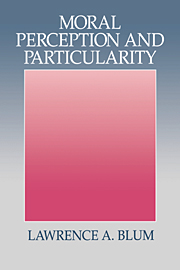3 - Moral perception and particularity
Published online by Cambridge University Press: 12 January 2010
Summary
Iris Murdoch's series of essays The Sovereignty of Good and her novels call our attention to the important role of moral perception in the moral life. How do agents come to perceive situations in the way they do? How does a situation come to have a particular character for a particular moral agent? What is the relation between our moral perceptual capacities and other psychological capacities essential to the moral life? These questions have drawn scant attention in contemporary ethical theory. Moral philosophy's customary focus on action-guiding rules and principles, on choice and decision, on universality and impartiality, and on obligation and right action have masked the importance of moral perception to a full and adequate account of moral agency. Yet although an agent may reason well in moral situations, uphold the strictest standards of impartiality for testing her maxims and moral principles, and be adept at deliberation, unless she perceives moral situations as moral situations, and unless she perceives their moral character accurately, her moral principles and skill at deliberation may be for naught. In fact, one of the most important moral differences between people is between those who miss and those who see various moral features of situations confronting them.
In discussing moral perception here, I relate it to the phenomenon of moral judgment, understood as the process that bridges the gap between moral rules (and principles) and particular situations. I show that, like moral perception, the phenomenon of moral judgment does speak to an important lacuna in principle-based theories of morality.
- Type
- Chapter
- Information
- Moral Perception and Particularity , pp. 30 - 62Publisher: Cambridge University PressPrint publication year: 1994
- 4
- Cited by



